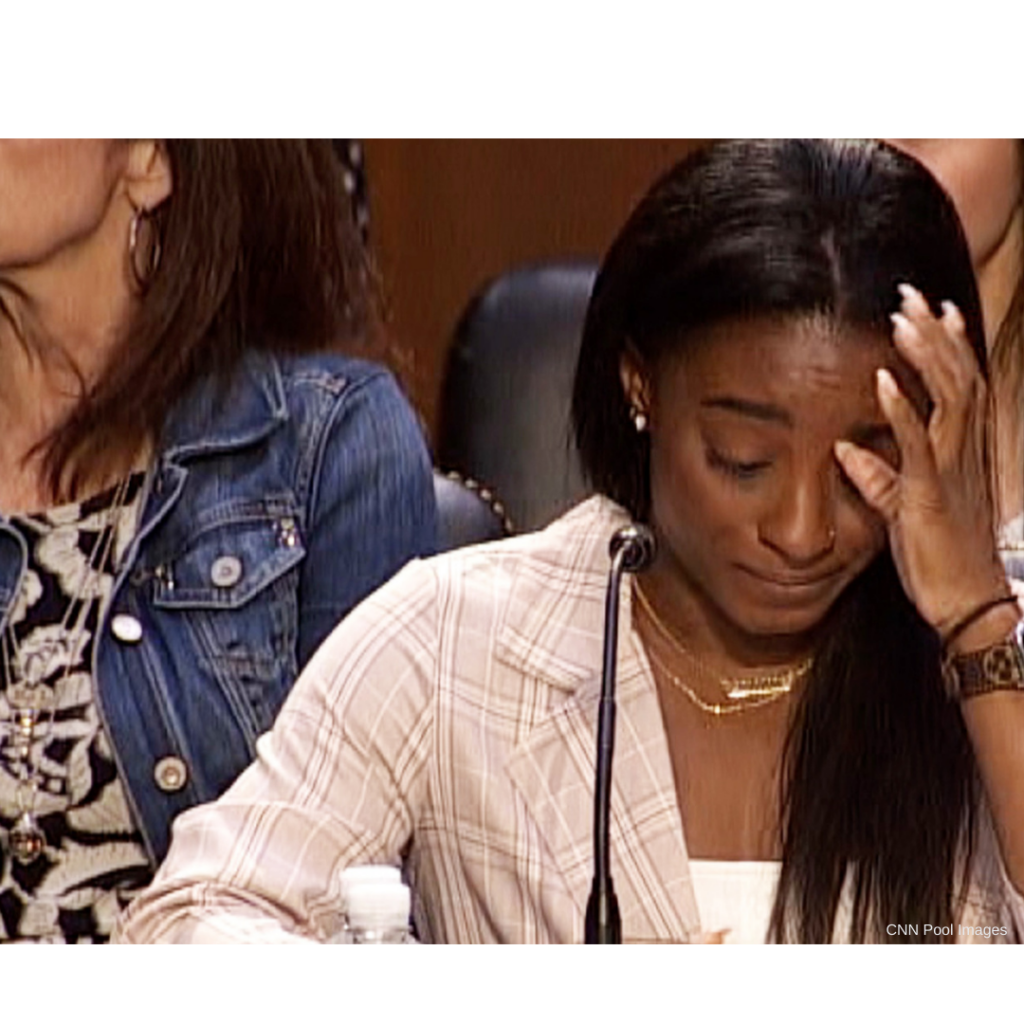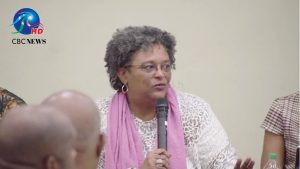A Senate hearing Wednesday gave several acclaimed gymnasts who were abused by Larry Nassar a powerful platform to call out the system that failed them.
Simone Biles, McKayla Maroney, Maggie Nichols and Aly Raisman focused on how the FBI botched its investigation into allegations against Nassar and the intimidation that came from the sport’s governing bodies.
Raisman described the lapses as being akin to “serving innocent children up to a pedophile, on a silver platter.”
As Biles put it, it was not just Nassar who she blamed, but also an entire infrastructure that “enabled and [perpetuated] his abuse.” She said she had decided to compete in the Tokyo Summer Olympics, in part, because her presence on the team would not allow the “crisis” to go “ignored.”
Their testimony before the Senate Judiciary Committee was incredibly moving and put a new light on how those who had turned a blind toward the abuse had not yet been held fully accountable.
Here are the key takeaways from the hearing:
The gymnasts revealed new details about how the FBI botched the investigation
The gymnasts gave new insight into how the FBI had mishandled their allegations, with accounts of what exactly they had told the FBI and how they had to work to get their allegations heard.
It was 14 months after she reported her allegations that Raisman finally got to speak to the FBI, she said, despite having repeated her requests for an interview.
USA Gymnastics head Steve Penny arranged for the interview to take place at the Olympic Training Center, Raisman said, “where I was under the control and observation of USA Gymnastics, and the United States Olympic and Paralympic Committee.”
“The day of my interview, Steve Penny flew to the Olympic Training Center, and he made sure I was aware he was there,” she said.
She said she also had been pressured by the FBI to accept a plea deal that was being proposed for Nassar.
“The agent diminished the significance of my abuse. It made me feel my criminal case wasn’t worth pursuing,” Raisman said.
Maroney, meanwhile, recalled the graphic details of Nassar’s abuse that she had provided to the FBI in September 2015. The agent who conducted the interview waited until 2017 to write a formal summary, and in it he included false information, according to the IG report.
“They chose to falsify my report, and to not only minimize my abuse, but silence me yet again,” Maroney said.
The gymnasts are still haunted by how the FBI botched the case
The gymnasts are still dealing with lasting effects of how FBI’s mishandled their allegations.
Maroney, recounting her 2015 interview, described how the agent who interviewed her remained “dead silent” as she started crying on the phone.
“I was so shocked at the agent’s silence and disregard for my trauma. After that minute of silence, he asked, ‘Is that all?’ ” Maroney recalled. “Those words, in itself was one of the worst moments of this entire process, for me to have my abuse be minimized and disregarded by the people who were supposed to protect me.”
Raisman, meanwhile, recalled how an FBI agent had “made me feel like my abuse didn’t count and it wasn’t a big deal.”
“And I remember sitting there with the FBI agent and him, trying to convince me that it wasn’t that bad,” she said. “And it’s taken me years of therapy to realize that my abuse was bad, that it does matter.”
Sen. Richard Blumenthal, a Connecticut Democrat, asked the gymnasts whether they knew any of the victims who had been abused by Nassar in the period after they had relayed their allegations in 2015. All four of them said they did, and Raisman said she felt “guilt and shame” about the athletes who had been abused by Nassar after they had reported their allegations.
“I can’t tell you how horrifying it is to meet young girls who look up to me, who watch me compete in the Olympics, and tell me that they went to see Nassar, because of me and my teammates, because they wanted to see the Olympic doctor,” Raisman said.
Gymnasts and lawmakers were enraged by DOJ’s refusal to prosecute FBI agents
The decision by the Justice Department not to charge two former FBI employees who were referred by the department’s inspector general for potential prosecution left both the gymnasts and lawmakers irate.
“Why?” Maroney asked pointedly, while criticizing Deputy Attorney General Lisa Monaco for declining a request to testify at Wednesday’s hearing.
“A message needs to be sent: If you allow a predator to harm children, the consequences will be swift and severe. Enough is enough,” Biles said.
Justice Department Inspector General Michael Horowitz noted later in the hearing that the false information one agent is accused of putting into a 2017 summary he wrote of his 2015 interview with Maroney could have jeopardized the criminal case brought against Nassar. Additionally, that agent and the other employee violated several FBI protocols, which led to a months-long delay in the probe, during which Nassar abused some 70 athletes, according to the report.
The FBI recently fired Michael Langeman, the agent who had interviewed Maroney, while the other official, Jay Abbott, retired in early 2018.
Lawmakers bashed the Justice Department for both its refusal to prosecute those individuals and how it had rebuffed their request that top department officials testify about the decision.
“The American people and these victims of sexual assault are left to wonder whether their claims are really being taken seriously, if there is simply a declination by the Department of Justice to prosecute, and no real willingness to come explain the rationale for that or why there isn’t some accountability where accountability can be had,” said Sen. John Cornyn, a Republican from Texas.
Attorney General Merrick Garland and Monaco are expected to appear before the committee in October.
Questions remain about the FBI’s cozy relationship with USA Gymnastics
The gymnasts emphasized the need for more investigation to understand the relationship between the FBI’s failures and how its agents interacted with the gymnastics organizations that overlooked Nassar’s abuse.
As the IG report recounted, the FBI agents and USA Gymnastics discussed the organization’s response to media stories about the allegations. Abbott also proposed an FBI statement that would put USA Gymnastics in a positive light, according to the IG. And he discussed with Penny, then the USA Gymnastics head, the potential that he could get a job at the US Olympic Committee. Abbott looked into applying to be the head of USA Gymnastics as well, the report said.
Nichols — an alum of the US’ world championship team whose allegations were among those brought to the FBI in 2015 — referenced Abbott’s USA Gymnastics aspirations as she ticked through questions that had not yet been answered about the FBI’s failures.
“The survivors of Larry Nassar have a right to know why their well-being was placed into jeopardy by these individuals who chose not to do their jobs,” Nichols said.
The gymnasts were failed by every level of the organizations that are supposed to protect them
What the gymnasts’ testimony made clear is that several people — in both the sport and in federal law enforcement — were aware of the allegations against Nassar and yet did not act to stop him.
“It is astonishing and disturbing how many adults let you down, and failed at one of the most basic responsibilities of adulthood, which is to look out for children,” said Democratic Sen. Sheldon Whitehouse of Rhode Island.
Biles recalled being left in the dark going into the 2016 Olympics that there were investigations into the allegations. For some time, she was also not aware that a top official in USA Gymnastics had been informed by Nichols in 2015 that Biles was also likely a victim.
Maroney accused the FBI of working “in concert” with the athletic organizations to “conceal” that Nassar was a predator.
“By not taking immediate action from my report, they allowed a child molester to go free for more than a year,” she said, “and this inaction directly allowed Nasser’s abuse to continue.”
Raisman said it was “horrible” to know about the victims who could have been spared the abuse had their allegations been acted on properly.
“All we needed was one adult to do the right thing,” Raisman said.
Wray was limited in his ability in front of the Senate to contain the damage
Faced with the calls for the individual agents to be prosecuted, Wray had to repeatedly tell lawmakers that it was not his call, but the Justice Department’s.
“I have done what I can do,” he said.
Wray was not the director of the FBI when the lapses occurred, and he said he was “heartsick and furious” once he learned the extent of the agency’s failures.
His testimony nonetheless walked a fine line of describing the individuals’ actions as “unacceptable” while claiming that they were not reflective of the agency as a whole.
“I want to make sure the public knows that the reprehensible conduct reflected in this report is not representative of the work that I see from our 37,000 folks every day. The actions, instead, of the agents described in this report are a discredit to all those men and women who do the job the right way,” Wray said.
While he described several policy changes — like new training requirements — that the FBI had made to prevent similar lapses, lawmakers expressed skepticism that that would be enough.
“You don’t change hearts and minds because somebody goes through this kind of training,” said Sen. Mazie Hirono, a Democrat from Hawaii.






More Stories
Trump meeting with Netanyahu
SpaceX cleared to launch Falcon 9 rocket
US arrests son of ‘El Chapo’